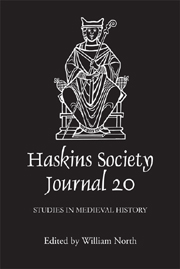Book contents
- Frontmatter
- Contents
- Editor's Note
- Abbreviations
- 1 Buckets, Monasteries, and Crannógs: Material Culture and the Rewriting of Early Medieval British History
- 2 Punishing Bodies and Saving Souls: Capital and Corporal Punishment in Late Anglo-Saxon England
- 3 Writing Latin History for a Lay Audience c. 1000: Dudo of Saint Quentin at the Norman Court
- 4 Between Neighbors and Saints: Waleran I of Meulan and the Allegiance of Lesser Lords in the Eleventh Century
- 5 Who Founded Durtal? Reconsidering the Evidence
- 6 Robert Curthose: Ineffectual Duke or Victim of Spin
- 7 The Chivalric Transformation and the Origins of Tournament as seen through Norman Chroniclers
- 8 An Internal Frontier? The Relationship between Mainland Southern Italy and Sicily in the ‘Norman’ Kingdom
- 9 ‘Hywel in the World’
- 10 Prices, Price Controls, and Market Forces in England under Edward I c. 1294–1307
9 - ‘Hywel in the World’
Published online by Cambridge University Press: 12 September 2012
- Frontmatter
- Contents
- Editor's Note
- Abbreviations
- 1 Buckets, Monasteries, and Crannógs: Material Culture and the Rewriting of Early Medieval British History
- 2 Punishing Bodies and Saving Souls: Capital and Corporal Punishment in Late Anglo-Saxon England
- 3 Writing Latin History for a Lay Audience c. 1000: Dudo of Saint Quentin at the Norman Court
- 4 Between Neighbors and Saints: Waleran I of Meulan and the Allegiance of Lesser Lords in the Eleventh Century
- 5 Who Founded Durtal? Reconsidering the Evidence
- 6 Robert Curthose: Ineffectual Duke or Victim of Spin
- 7 The Chivalric Transformation and the Origins of Tournament as seen through Norman Chroniclers
- 8 An Internal Frontier? The Relationship between Mainland Southern Italy and Sicily in the ‘Norman’ Kingdom
- 9 ‘Hywel in the World’
- 10 Prices, Price Controls, and Market Forces in England under Edward I c. 1294–1307
Summary
‘Let us imagine …’: thus begins Stephen Greenblatt's acclaimed study of Shakespeare, Will in the World, from which I have quite obviously pilfered the title of this essay. With these three simple words, readers are swept away into a version of the past that is at once completely plausible and yet, in its details, entirely hypothetical. Greenblatt's ‘speculative’ biography takes us from the vilest of taverns to the glittering Elizabethan court, and from dangerously overcrowded theaters to the iciest and most solitary of marriage beds. Ironically, it is primarily the biographer's own artistry that allows us to follow the Bard on this imagined journey of himself for, as one critic observed, ‘The things we know for sure about Shakespeare's life could be put into three pages and read aloud on Nickelodeon.’ Of course, the same could be said of any number of historical figures familiar to readers of this journal. Indeed, pre-modern specialists require more in the way of imagination than most, disposing as they all too often do of evidence so scanty as to be nearly invisible to the naked eye. As I recently overheard one of our more experienced undergraduates explain to a sophomore just entering the major, medieval and Renaissance are the best fields of history to study because there isn't any evidence to worry about and it is therefore impossible to be wrong. ‘Of course,’ he then added sagely, ‘it is also impossible to be right.’
- Type
- Chapter
- Information
- The Haskins Society Journal 202008 - Studies in Medieval History, pp. 175 - 203Publisher: Boydell & BrewerPrint publication year: 2009



